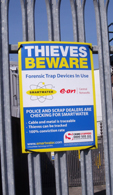An engineering company, police and Birmingham City Council are working to combat metal thefts on Birmingham’s roads.
The theft of gully covers is a threat to all road users. An open gully presents a risk to cyclists and pedestrians in particular, especially in the dark, as they can be very difficult to see. Vehicles can also be damaged if they hit an open gully. Now in use is a forensic identifier on manhole covers across the city, which leaves an indelible mark, visible under ultraviolet (UV) light, on the cover, and anyone who touches it. Stolen covers can then be identified with the aid of UV light and the grease used by Amey and the council will contain a unique molecular code.
Covers across the city are to be marked with the forensic marking grease from RedWeb, which has Police Preferred Specification status and has been approved by the Association of Chief Police Officers.
Amey supplies the police with a list of stolen covers and the locations, each week. Joint visits to local scrap dealers are being arranged to deter them from accepting any metal gratings other than from legitimate sources. The trade body the British Metals Recycling Association will be notifying their members to look out for the stolen and identifiable gully covers. Backing up the campaign is signage to warn would-be thieves that if they attempt to steal the covers, they will be “forensically tagged”.
John Sunderland, Amey business director, said: “Stolen gully covers are a major threat to the safety of all road users, and Amey and Birmingham City Council are working hard to address this issue. This innovative solution should deter thieves from taking the covers in the first place and scrap dealers from accepting them. It will also make apprehension of the thieves and recovery of the covers easier.” Amey are trialling use of composite replacement covers on some roads. These gratings are made from a unique recycled material that has no resale value. The grate can be sealed in with silicon sealant to further prevent theft or vandalism if required. The composite material is much lighter than traditional concrete or metal materials and can be fitted by one person.
Councillor Timothy Huxtable, Cabinet Member for Transport, Environment and Regeneration, said: “We will not tolerate thieves putting road users’ safety at risk in this way. We are delighted to be able to roll out the forensic grease and hope thieves will pay attention to the message that we will not allow them to endanger people in the city in this way.”
Detective Chief Inspector Angie Whitaker, the West Midlands Police lead for metal theft, said: “We have dedicated officers working in the West Midlands to specifically tackle metal theft, as this kind of crime is having a significant impact on the region. We have seen all kinds of metal items stolen, from plaques to lead from windows, but one item that continues to create problems for authorities and residents alike is the theft of gully covers. No metal recycler should be accepting this kind of item and anyone found to be illegally in possession of gully covers will be prosecuted.
“We welcome any initiatives that may positively impact upon these kinds of offences and make thieves think twice before committing such crimes.”










